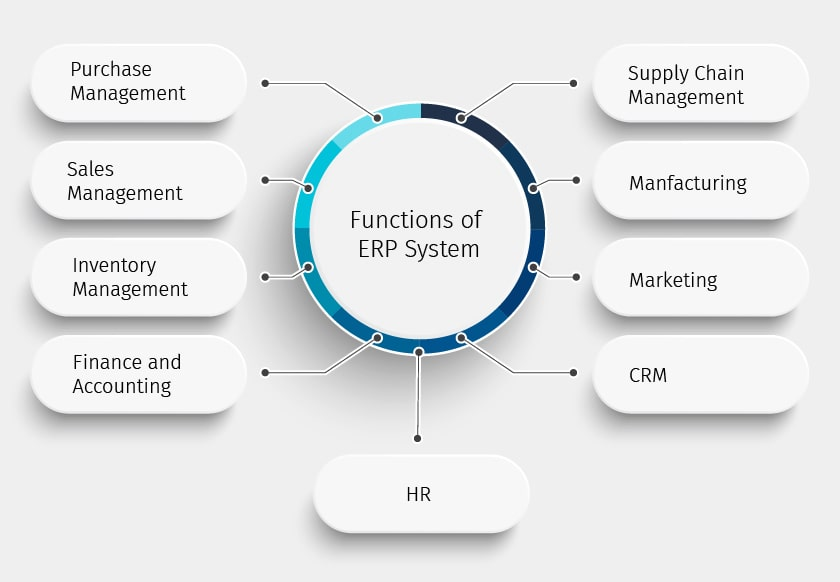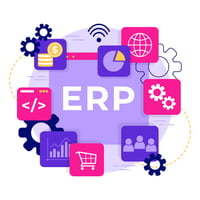Introduction
Welcome to our comprehensive guide to ERP (Enterprise Resource Planning). In this article, we will delve deep into the world of ERP, exploring its definition, benefits, implementation, and its significance for modern businesses. We aim to provide you with all the essential information you need to understand ERP fully and utilize it to its maximum potential.
What is ERP?
ERP, short for Enterprise Resource Planning, is a sophisticated software solution that integrates and manages various business processes within an organization. It streamlines and automates tasks related to finance, human resources, supply chain, manufacturing, customer relationship management (CRM), and more, all under one unified system.
With ERP, companies can break down departmental silos and achieve seamless communication and collaboration among different teams, departments, and even different geographical locations. The software empowers businesses to access real-time data, make data-driven decisions, and optimize their operations for greater efficiency and productivity.
Key Features and Modules of ERP
- Finance and Accounting Module: This module manages financial transactions, general ledger, accounts payable, accounts receivable, and budgeting. It ensures accurate financial reporting and compliance.
- Human Resources Module: ERP's HR module oversees employee information, payroll, benefits administration, time tracking, and performance management. It streamlines HR processes and improves workforce management.
- Supply Chain Management Module: This module handles inventory, procurement, order management, supplier relationship management, and demand forecasting. It optimizes the supply chain for cost-effectiveness and faster order fulfillment.
- Manufacturing Module: The manufacturing module monitors production planning, scheduling, shop floor control, and quality control. It aids in optimizing manufacturing processes and reducing production costs.
- Customer Relationship Management (CRM) Module: ERP's CRM module manages customer data, sales, marketing, and customer service. It enhances customer satisfaction and retention.
- Business Intelligence (BI) Module: This module provides advanced analytics and reporting capabilities, helping businesses gain valuable insights from their data for informed decision-making.
Benefits of Implementing ERP
- Enhanced Efficiency: By integrating and automating processes, ERP reduces manual work and increases overall efficiency, allowing employees to focus on higher-value tasks.
- Streamlined Communication: Break down communication barriers between departments, promoting collaboration and improving information flow.
- Data-Driven Decision Making: Real-time data access empowers management to make well-informed decisions based on accurate insights.
- Cost Savings: ERP eliminates duplicate efforts, reduces inventory holding costs, and optimizes the supply chain, resulting in significant cost savings.
- Improved Customer Satisfaction: Better customer data management and streamlined processes lead to improved customer service and satisfaction.
- Regulatory Compliance: Adhere to regulatory requirements and industry standards through accurate record-keeping and reporting.
Implementing ERP: Key Considerations
- Business Analysis: Before implementing ERP, conduct a thorough analysis of your organization's needs and processes. Understand the pain points and identify the areas where ERP can make the most significant impact.
- Selecting the Right System: Choose an ERP system that aligns with your business goals and requirements. Consider factors like scalability, ease of integration, vendor reputation, and customer support.
- Data Migration and Integration: Ensure a seamless transfer of data from existing systems to the new ERP platform. Integration with other business applications is vital for smooth operations.
- User Training and Change Management: Proper training and change management strategies are crucial for successful adoption by your employees.
Cloud ERP
Most ERP systems are true Software as a Service Cloud solutions now. Which has made the investment much less expensive especially initial stand up costs. No need to buy hardware or dedicated SQL servers, You literally buy a service and have an expert configure it for your specific business or industry. What is super nice about ERP in the cloud is little annoying updates such as sales tax rate updates are done behind the scenes and just sending the user base a note telling them it was updated. This is especially user-friendly when you sell in multiple states or countries.
Conclusion
ERP is a game-changer for modern businesses, providing them with the tools they need to stay competitive in today's fast-paced world. By centralizing data, automating processes, and fostering collaboration, ERP helps organizations achieve higher efficiency, reduced costs, and improved customer satisfaction. To successfully outrank competitors, it's essential to grasp the significance of ERP and its implementation process fully.
Remember that each organization's needs are unique, so careful planning, choosing the right ERP system, and thorough user training are the keys to a successful implementation that can bring lasting benefits to your business.
Our team of professionals at UniverseIT can help you with understanding what you need and giving you options for deployment. We have options starting at $2,499 for a rapid deployment of Dynamics 365 Business Central. And we have other options tailored for more comprehensive needs as well. Contact us to learn more.








